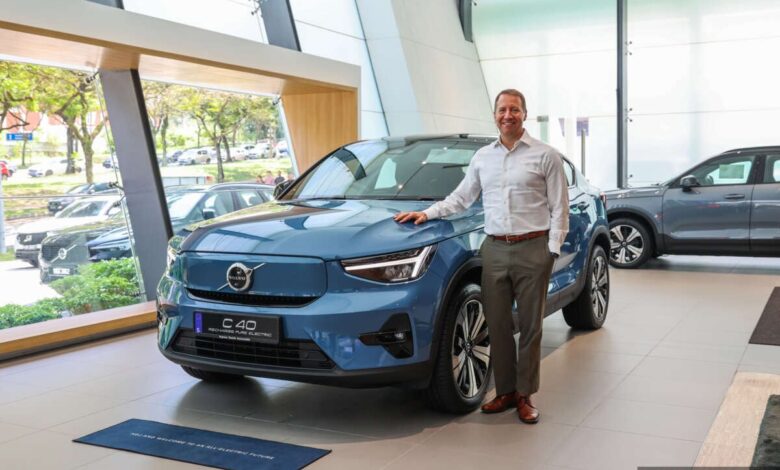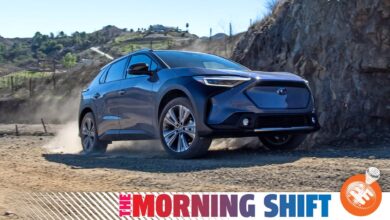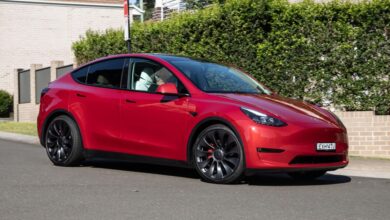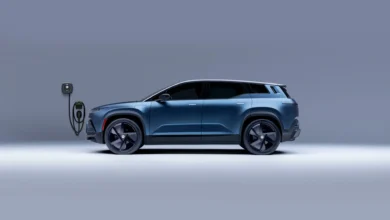Volvo Car Malaysia MD Charles Frump interviewed – going all in with EVs, EX30 here before EX90 in 2024

Volvo is well and truly committed to the electrification cause, and this extends to Volvo Car Malaysia as well. With the recent global unveiling of the EX30 and before that, the EX90 flagship of the range, these are two models that have been confirmed to be coming to the Malaysian market.
Volvo Car Malaysia MD Charles Frump has revealed at a media roundtable that of the two EVs, it is the smaller model, the EX30 that will be making its Malaysian arrival first. Along the way, Frump also offered insights into the brand’s direction in Malaysia.
What is the latest projection for the arrival of the EX90 and EX30?
Charles Frump: We’re super excited to have those cars coming here, but it won’t happen this year. Our product cadence will take some time for CKD operations to begin, and the EX30 will come first in Malaysia.
Initially the EX90 was supposed to come in by the end of next year, but software issues have delayed production. Any software issues with the EX30 as well?
CF: We haven’t really adjusted any plans locally, but I think any global effects will have knock-on effects for us [in Malaysia]. With the way that’s playing out now, the EX30 will come first.
If you look at the press release for the EX90, it is to ensure that everything is right and perfect, which is the reason for the change in launch timing. That actually gives me good peace of mind, that when the cars come here, especially after a bit of time on the road in Europe, we’ve always found that the quality is quite good.
Is there a specific commitment as to the number of EVs coming in?
CF: There’s not. With government approvals, there’s been a certain number of cars you’re allowed to import under certain schemes. With electric cars now, it’s more of a public scheme, and up to 2025 there’s no excise tax, no sales tax, no road tax, so those things are unaffected by how many cars we bring in. It also helps us with our planning, knowing that legislation is set, which is great for us.
Regarding Volvo Car Malaysia’s ambitious targets for 2025 and 2030, how confident are you in achieving those targets?
CF: From a company perspective we have pledged to be fully electric by 2030, which is unwavering and a real milestone that we’re heading towards.
Essentially that [objective] is already built in, we’ve already stopped development of petrol engines, we’re only launching fully electric cars from this point forwards at a very good cadence. That 2030 target globally for going all electric, will be for Malaysia as well.
When you look at the 2025 target of getting 50% electric vehicle volume by that date, the launch cadence that we have puts us well on track. More in terms of the local market, one of the things that we’ve had very good uptake on are the XC40 Electric, C40, as well as our plug-in hybrids.
One of the things that we’ve been saying, is that I’m getting more and more confident that Malaysia will exceed the 50% EV adoption rate by 2025. One of the things I’m very happy to share is that we have 72% of our cars sold last year were a combination of BEVs and PHEVs. That gives us a good sense of where the market is heading.
The latest Malaysian budget saw the extension of tax incentives for EVs. Does Volvo think that the time extension is enough to develop a robust EV industry locally?
CF:The government’s doing a pretty good job on this, I must say; the longer [the tax exemption], the better, right? what has been done in having 0% excise duty, 0% road tax, 0% sales tax, has allowed us, in terms of electric vehicles, to have a long-term strategy here, [such as saying] we can make the commitment on CKD operations and on volumes.
Even when it was just 2025 and now it’s been extended to 2027, that’s a pretty good planning range for us. The longer the better, of course, but with that, that’s within our window of launching the EX30, [and for the] EX90, so I think that’s given us a good base for strategic planning.
One thing that’s often not really understood is the PHEVs. We also get very good support for PHEVs. In addition to being a great solution to going fully electric, it’s a step-by-step approach you can take for those who aren’t quite ready to go full electric and have concerns around infrastructure.
They can use the PHEVs, and the fact that there is some support and that the government understands that [PHEVs] should also be supported, allows us to offer those at a very competitive price.
As a result of that, when we put BEVs and PHEVs together which make up 72% of our cars sold, that is thanks to a tailwind from the government.
If I think about what I would like to see when we meet with the government ministers, one of the things I like to tell them is that I’m not so concerned about having perfect infrastructure between here [Kuala Lumpur] and Penang, what I’m really interested in seeing is that we’re setting up households to be able to charge at home.
As we’re building new apartments, upgrading apartments, as we’re working on the grid and making sure it can support – and this is a major factor – if you want an adoption of BEVs and PHEVs, home charging is really the key. I think we tend to get lost on having extensive [charging] networks and the like; if you charge at home, you’re 99% there.
The problem we run into is that some can’t charge at home. For us, that is not so much of an issue, especially with our higher-end cars, but as time goes on we’re looking at more affordable cars like the EX30, and there’s the possibility that could be their only car, then it could become more of a challenge.
But right now, typically our customers are buying a 2nd car that’s an electric car, and they can typically have a landed property or high-end living arrangements where they have a charger, so I think luxury cars will lead electrification as a result of that.
If we can get the government concentrating on home electrification, I think that really is the key, more than having more public infrastructure.
Have you been in direct discussions with the government on the upcoming EV road tax structure?
CF: Not very formally, but recently it was at an event with the Swedish Embassy with transport minister Anthony Loke. We’ve had some chats with him and talking about [matters such as] road tax, which is currently based on horsepower. When you look at an EV that has a huge horsepower output, it could be a disincentive for people when they get a big surprise of a road tax bill.
He stated in that event that the government wants to look at that and make sure that its in line with their EV adoption policy, so I think they are working on it, and I fully expect that by the time the new road tax structure is announced in 2025, that it will be in line with their goals. Right now it’s the opposite of that, and I think they recognise that. So that was quite a big win for us when he announced it at our event.
Volvo is still a fair way behind the two German premium brands in terms of overall volume in Malaysia. How do you see this evolving over the next few years, and specifically involving electric vehicles?
CF: I hope we can keep the momentum going. In the last five years we’ve tripled our volume. There are very few people who are looking at luxury cars, especially luxury SUVs, who don’t have us on their list; five years ago that wasn’t the case. Looking back at last year, we are up 43%, and by our count we are the fastest-growing luxury car company in Malaysia.
So if we can keep that up, I think those numbers, that gap [to the German brands] can start to narrow. I do think that we have a unique opportunity when it comes to electrification. When there’s this kind of change in the industry, it does allow for some changes in market share, and this is something that we’re looking for as an opportunity.
As a company we’re leaning in heavily in electrification, and as the market shifts there, we hope to be there quicker, and first. We have a great line of full BEVs coming, so we are very optimistic. If we can keep up the pace in narrowing that gap [to the German brands] we would be very happy.
What have been the major hurdles to overcome in achieving higher volumes in Malaysia, or is that the intention at all?
CF: I think everyone’s goal is to sell more cars, and regardless of how the market goes up and down, the last couple of years with sales tax exemption, the [EV] market is up, and I think that we’ve gotten more than our share. I don’t think there’s really any impediment other than what the total industry volume is going to be, and what the total EV industry is going to be, and how much of that we are going to get.
Little by little we’re creeping up our market share, which is great. We’re not totally reliant on the adoption rate of electrification as well. One of the things we’re talking about today is our plug-in hybrid line-ups. We’ve now extended the range to 90 km for a PHEV. That kind of range allows for a fully electric usage in [most daily situations], especially if you have a charger at home.
I drive a C40 right now, and that has a very long range. But I typically only use 10-20% of the battery’s charge, at the most. That’s more than doable within the range of a PHEV, so for those who aren’t ready to make the full leap [to BEVs], we now have, with our extended range PHEVs, a chance to go step-by-step into electrification.
In terms of PHEVs, often seen as a stop gap solution before going full EV, for how much longer will Volvo be championing this technology? And if a customer is choosing between ICE, PHEV and BEV cars, how would you help them make the decision?
CF: Some key questions that I would ask: Is this your only car? Can you charge at home? What are you going to use your car for? If you need room for seven persons, it’s going to be an XC90, and that’s what it will be.
If you’re choosing between an XC60 and XC40 PHEV or XC40 Pure Electric BEV, so long as the sizes are okay for them, if you have a 2nd car, and you have home charging, easily I would say go for the BEV. If you don’t have those two things then it’s time to dig a little deeper, and then a PHEV might be a better choice.
Is this the SOP for all sales staff?
CF: We have extensive training in these areas, and there’s a needs-based assessment. Whenever you walk into a Volvo dealership, we want to have a car that is going to fit for you. When the customer comes in, the first thing they get is a needs assessment.
It’s interesting to think that assessment has changed, when you’re thinking about not just car size and usage, now you’re talking about levels of electrification which has to come into that needs assessment. Getting that right is not easy; That involves listening to the customer and working very closely with our dealers to make sure that we are getting the right car for the right customer.
What proportion of your customer base would you say represents a more unusual use case, such as having purchased a BEV but they don’t have access to on-site charging?
CF: It’s a small proportion. I think they’re very passionate [about EVs] to want to do that, and they want to have an impact. It’s one of the ultimate use cases because you’ll find that the [battery] range is really long, and you can go, within a week and you go to a mall and you plug in your car, it will work.
But I still think this is a small proportion of use cases. The majority of our customers, especially for fully electric vehicles, have charging available at home, and/or a second car.





















